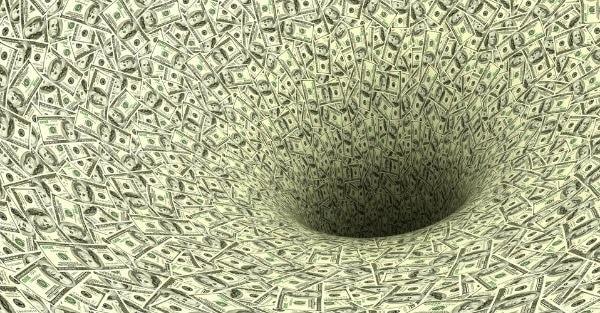“Inflation” occurs when the creation of currency outruns the creation of real wealth it can bid for… It isn’t caused by price increases; rather, it causes price increases.

Inflation is not caused by the butcher, the baker, or the automaker, although they usually get blamed. On the contrary, by producing real wealth, they fight the effects of inflation. Inflation is the work of government alone since the government alone controls the creation of currency.
In a true free-market society, the only way a person or organization can legitimately obtain wealth is through production. “Making money” is no different from “creating wealth,” and money is nothing but a certificate of production. In our world, however, the government can create currency at trivial cost, and spend it at full value in the marketplace. If taxation is the expropriation of wealth by force, then inflation is its expropriation by fraud.
To inflate, a government needs complete control of a country’s legal money. This has the widest possible implications since money is much more than just a medium of exchange. Money is the means by which all other material goods are valued. It represents, in an objective way, the hours of one’s life spent in acquiring it. And if enough money allows one to live life as one wishes, it represents freedom as well. It represents all the good things one hopes to have, do, and provide for others. Money is life concentrated.
As the state becomes more powerful and is expected to provide more resources to selected groups, its demand for funds escalates. The government naturally prefers to avoid imposing more taxes as people become less able (or willing) to pay them. It runs greater budget deficits, choosing to borrow what it needs. As the market becomes less able (or willing) to lend it money, it turns to inflation, selling ever greater amounts of its debt to its central bank, which pays for the debt by printing more money.
As the supply of currency rises, it loses value relative to other things, and prices rise. The process is vastly more destructive than taxation, which merely dissipates wealth. Inflation undermines and destroys the basis for valuing all goods relative to others and the basis for allocating resources intelligently. It creates the business cycle and causes the resulting misallocations and distortions in the economy.
We know the old saw “The rich get richer, and the poor get poorer.” No one ever said life had to be fair, but usually, there is no a priori reason why the rich must get richer. In a free-market society, the sayings “Shirtsleeves to shirtsleeves in three generations” and “A fool and his money are soon parted” might be better descriptions of reality. We do not live in a free-market society, however.
The rich and the poor do have a tendency to draw apart as a society becomes more bureaucratic, but not because of any cosmic law. It’s a consequence of any highly politicized system. The government, to paraphrase Willie Sutton, is where the money is. The bigger government becomes, the more effort the rich, and those who want to get that way will put into making the government do things their way.
Only the rich can afford the legal counsel it takes to weave and dodge through the laws that restrict the masses. The rich can afford the accountants to chart a path through loopholes in the tax laws. The rich have the credit to borrow and thereby profit from inflation. The rich can pay to influence how the government distorts the economy so that the distortions are profitable to them.
The point is not that rich people are bad guys (the political hacks who cater to them are a different question). It is just that in a heavily regulated, highly taxed, and inflationary society, there’s a strong tendency for the rich to get richer at the expense of the poor, who are hurt by the same actions of the government.
Always, and without exception, the most socialistic, or centrally planned, economies have the most unequal distribution of wealth. In those societies the unprincipled become rich, and the rich stay that way, through political power. In free societies, the rich can get richer only by providing goods and services others want at a price they can afford.
As inflation gets worse, there will be a growing public outcry for the government to do something, anything, about it.
People will join political action committees, lobbying groups, and political parties in hopes of gaining leverage to impose their will on the country at large, ostensibly for its own good.
Possible government “solutions” will include wage and price controls, credit controls, restrictions on changing jobs, controls on withdrawing money from bank accounts, import and export restrictions, restrictions on the use of cash to prevent tax evasion, nationalization, even martial law—almost anything is possible. None of these “solutions” addresses the root cause—state intervention in the economy. Each will just make things worse rather than better.
What these solutions all share is their political nature; in order to work, they require that some people be forced to obey the orders of others.
Whether you or I or a taxi driver on the street thinks a particular solution is good or not is irrelevant. All of the problems that are just beginning to crash down around society’s head (e.g., a bankrupt Social Security system, federally protected banks that are bankrupt, a monetary system gone haywire) used to be solutions, and they must have seemed “good” at the time, otherwise they’d never have been adopted.
The real problem is not what is done but rather how it is done: that is, through the political process or through the free market. The difference is that between coercion and voluntarism. It’s also the difference between getting excited, frustrated, and beating your head against a wall and taking positive action to improve your own standard of living, to live life the way you like it, and, by your own example, to influence society in the direction that you’d like to see it take—but without asking the government to hold a gun to anyone’s head.
Political action can change things. Russians in the ’20s, Germans in the ’30s, Chinese in the ’40s, Cubans in the ’50s, Congolese in the ’60s, South Vietnamese and Cambodians in the ’70s, then Rhodesians, Bosnians, Rwandans, and Venezuelans today are among those who certainly discovered it can. It’s just that the changes usually aren’t very constructive.
That’s the nature of government; it doesn’t create wealth, it only allocates what others have created. More typically, it either dissipates wealth or misallocates it, because it acts in ways that are politically productive (i.e., that gratify and enhance the power of politicians) rather than economically productive (i.e., that allow individuals to satisfy their desires in the ways they prefer).
It’s irresponsible to base your own life on what hundreds of millions of other people and their rulers may or may not do. The essence of being a free person is to be causative over your own actions and destiny, not to be the effect of others. You can’t control what others will do, but you can control yourself.
If you’re counting on other people, or political solutions of some type, most likely it will make you unwary and complacent, secure in the hope that “they” know what they’re doing and you needn’t get yourself all flustered with worries about the collapse of the economy.
Whether it’s groceries, medical care, tuition, or rent, it seems the cost of everything is rising. It’s an established trend in motion that is accelerating, and now approaching a breaking point. At the same time, the world is facing a severe crisis on multiple fronts. Gold is just about the only place to be. Gold tends to do well during periods of turmoil—for both wealth preservation and speculative gains. That’s precisely why we just released an urgent video. It reveals how it will all play out and what you can do about it. Click here to watch it now. Source
These same money changers were associated with others who engaged in shady business practices in the temple courts. Some sold sacrificial animals, overcharging people who did not bring their own. Others were in charge of examining the animals to be sacrificed, and it was a simple matter to declare an animal “unapproved” and force the worshiper to buy another animal—at an inflated price—from the temple vendors. Such goings-on, exploiting the poor and the foreigner, angered the Lord Jesus and was strictly forbidden in the Mosaic Law (Exodus 22:21; Leviticus 19:34).
Current uncertainty and worries are clearly reflected in the financial markets. Investors are fleeing into assets that are deemed safe such as gold, U.S. Treasuries and the dollar. They still flock to the U.S. on a massive scale whereas a lot of the current insecurity derives directly from the White House. At the same time, we are seeing more and more commentaries around the question of whether a shift is taking place, slowly but surely, from the dollar toward other currencies.
JP Morgan recently wrote, “We believe the dollar could lose its status as the world’s dominant currency (which could see it depreciate over the medium term) due to structural reasons as well as cyclical impediments.”
And this month, Bank of England Governor Mark Carney claimed that the dollar’s status as a hegemon is putting the global economy under increasing strain and needs to end.

That the dominance of the dollar is being questioned is not surprising at the present juncture:
Current and future U.S. policies look vague or non-existent. Allies as well as enemies feel out of control as they have to wait and see what storms are brewing in the U.S. president’s Twitter feed, about to be unleashed.
Countries such as China and Russia are taking an increasingly assertive stance.
The relative supremacy of the U.S. has been waning and there are mounting doubts whether the country will continue to support and shore up the international system that it has largely build up and shaped itself.
The power of the United States may be lessening in a relative sense but the country has its tentacles in projects and countries virtually all over the world.
Owing to the role of U.S. financial institutions, authorities and the dollar in SWIFT (the international payment system) non-U.S. businesses are terrified that they will incur billions of dollars in fines.They worry that this will happen as soon as there is even a tiny shred of evidence that can connect them to a country or corporation hit by sanctions from Washington. Therefore, many states are looking for ways to become less reliant on the dollar and the U.S. in general.
America really started to move toward hegemony just before the end and after World War II when the Allied nations set up the Bretton Woods system. Subsequently, the U.S. managed to further amass the financial-economic, political, and military power that allows it to leave a structural and sweeping mark on the world.
At the same time, Americans have been criticized for being overbearing. As early as the 1960s, the then French president de Gaulle irritably said it was an exorbitant privilege for the Americans that the dollar was the global reserve currency. Attempts have been made from time to time to weaken the dominance of the dollar; mostly without much success.
Nevertheless, things are shifting in a way that seems to suggest that countries want to become less dependent on the dollar. Whereas China owned 14 percent of U.S. government paper in 2011 that percentage has dropped to seven by now. Viewed from a broader perspective, it is clear that the dollar reserves at other central banks have started to play a slightly less prominent role.
Some 70 percent of the currency reserves of central banks consisted of dollars around the year 2000 whereas this share is currently 60 percent. We are also seeing political initiatives by countries trying to keep away from the clutches of the U.S. financial system and the dollar.
Europe wants to continue to trade with Iran via the so-called INSTAX instrument as parties try to bypass the U.S. sanction regime. And there are more and more initiatives that are intended to ensure that countries can trade in their domestic currencies instead of using the dollar. For instance in the context of energy trading between China and Russia.
However, specifically, the buying and selling of oil and other energy sources show how “sticky” the U.S. hegemony still is. Eighty percent of global oil trades are paid in dollars. And there are other sobering data:
1. The dollar is used by counter parties in 80 to 90 percent of all currency transactions.
2. The dollar comprises 62 percent of the global currency reserves whereas the euro is in second places with a meagre 20 percent.
3. Sixty percent of international outstanding debt is priced in dollars.
Another concrete example: Brazil and India are paying 80 percent of their imports in dollars whereas just a fraction of the imports hails from the U.S. itself.
History shows that an incumbent power can hold on to certain privileges and power sources for a very long time even after a marked decline. America had a larger economy than the United Kingdom as early as 1870 but the pound continued to be the world’s most important currency for decades afterward.
The dollar will not be replaced as the global currency any time soon. At the same time, the tentative measures that countries are taking to reduce their dependency on the dollar show they are anticipating a post-America era is in the making. This trend is bound to strengthen now that the U.S. is regarded as an increasingly fickle opponent and unpredictable ally. Business Finance Source Source: HNewsWire Bankster ZeroHedge
StevieRay Hansen
Editor, Bankster Crime
MY MISSION IS NOT TO CONVINCE YOU, ONLY TO INFORM YOU…
The Birth Pains Are Growing Stronger….
“Unless God has raised you up for this very thing, you will be worn out by the opposition of man and devils”…
My name is Steve Meyers and I need to share a vision and warning that the Lord showed me back in April 2007….
Many of you will ask why I waited so long to share the warning. I didn’t. I shared the story with everyone that would listen from pastors to friends to family to colleagues. Immediately following the initial vision, I called a close friend. I told him to sit down that I had something to tell him. I needed it documented as I knew this was supernatural and from God. As I witness events unfolding today, I need to share the vision again.
The risk of loss in trading futures and options on futures can be substantial. The author does not guarantee the accuracy of the above information, although it is believed that the sources are reliable and the information accurate. The author assumes no liability or responsibility for direct or indirect, special, consequential or incidental damages or for any other damages relating or arising out of any action taken as a result of any information or advice contained in this commentary. The author disclaims any express or implied liability or responsibility for any action taken, which is solely at the liability and responsibility of the user. Steve Meyers
People’s hearts are troubled, their minds are in a state of confusion, the Bible tells us a time of great delusion that will come upon the people, that time has arrived, the politicians must come up with more significant and more believable lies in order to bring on the antichrist, we have entered the doorstep Tribulation.
“Unless God has raised you up for this very thing, you will be worn out by the opposition of man and devils”…

Tagged Under: #Fraud #Banks #Money #Corruption #Bankers,#Powerful Politicians, #Businessmen
![]()



